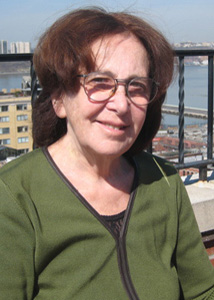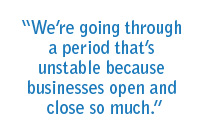 Born in Brooklyn in 1935, writer and feminist Susan Brownmiller’s groundbreaking book, “Against Our Will,” was published in 1975 and changed forever the way society looks at rape. Since then she has written—among other things—”In Our Time,” a memoir of the feminist revolution, and the novel “Waverly Place.” These days Ms. Brownmiller teaches travel writing at NYU and women’s studies at Pace.
Born in Brooklyn in 1935, writer and feminist Susan Brownmiller’s groundbreaking book, “Against Our Will,” was published in 1975 and changed forever the way society looks at rape. Since then she has written—among other things—”In Our Time,” a memoir of the feminist revolution, and the novel “Waverly Place.” These days Ms. Brownmiller teaches travel writing at NYU and women’s studies at Pace.
For Susan Brownmiller, childhood nurturing by both her family and schools provided a foundation that still supports her. “My parents truly appreciated the arts and culture,” she recalls. “I was taken to plays, dance recitals, and concerts. There were always books and newspapers in our home. And Franklin D. Roosevelt was king in our house! In addition, I went to schools that actually encouraged writing. It’s amazing in light of what you read about the state of schools today, but in our little part of Brooklyn there was a lot of attention paid to writing and to literature.”
After graduating from Cornell, Brownmiller first moved to New York to be an actor. “While studying acting,” she says, “I accidentally fell into editorial-type jobs for magazines and learned some skills.” Her writing career actually started in Mississippi. “I went there in the summer of 1964 as a volunteer to work in the civil rights movement,” she says. “In fact, I wrote my first piece for the Village Voice from Mississippi. It was a momentous summer for the nation, as well as for myself. But my whole life I’ve always asked myself, ‘Am I an activist, am I a writer, am I a hopeful actor?’ I was very lucky when the women’s movement came along because I could combine my activism with writing.”
It was being inside this movement that changed Brownmiller’s mind about rape and prompted her to write Against Our Will. “I had grown up with the misconception liberals held that no woman could be raped against her will,” she says. “But a new movement surfaced that had rediscovered rape and took it out of the dark ages. What had been missing was the voice of women who actually experienced rape and how they felt during it; the fear that they could possibly die. Before that, nobody had elicited any great body of information from women themselves. Then it dawned on people that we weren’t talking about the defendants, but about the victims.” Against our Will became a seminal work in its field and in 1995 the New York Public Library declared it one of 100 most important books of the 20th century. After its publication, Brownmiller spent the next two years lecturing about rape at colleges and universities across the country. More importantly, “I watched the nation’s laws on sexual assault change to reflect a victim’s understanding of the crime,” she says.
 Brownmiller moved to the West Village in 1966 prompted, oddly enough, by a desire to recapture the charm of Center City, Philadelphia where she had once briefly lived. “When I first moved here to Jane Street, nobody wanted to live this far west,” she says, laughing. “I remember when Hudson Street was filled with furniture stripping places. I remember when the Meatpacking district was absolutely thriving, but as an industrial area. I remember the frankfurter factory on the corner of Jane and Greenwich Streets and the ice cream factory on Jane Street. And there was the smell of ink from the Superior Inks factory down by the river.”
Brownmiller moved to the West Village in 1966 prompted, oddly enough, by a desire to recapture the charm of Center City, Philadelphia where she had once briefly lived. “When I first moved here to Jane Street, nobody wanted to live this far west,” she says, laughing. “I remember when Hudson Street was filled with furniture stripping places. I remember when the Meatpacking district was absolutely thriving, but as an industrial area. I remember the frankfurter factory on the corner of Jane and Greenwich Streets and the ice cream factory on Jane Street. And there was the smell of ink from the Superior Inks factory down by the river.”
And how has it changed? “Suddenly, I’m living on the edge of a very trendy neighborhood of restaurants and clubs,” Brownmiller observes. “The character of people has changed, too. It seems to me we used to have people with less money but with more commitment to art and writing. And the whole concept of the local neighborhood restaurant is gone from the West Village!” The pace of change here can be startling as well, she admits. “When I walk around, I find myself saying, ‘When did this restaurant or business close and when did this one open?’” She laughs. “It’s like a travel experience!”
Brownmiller does see things stabilizing at some point, though. “We’re going through a period that’s unstable because businesses open and close so much,” she says. “But I think this time will pass. It will stabilize. I think is has to stabilize and we’ll move back to a more friendly neighborhood and not one so concerned with attracting a trendy crowd. That crowd never stays in one place for long, anyway.”
Photo: MDM
